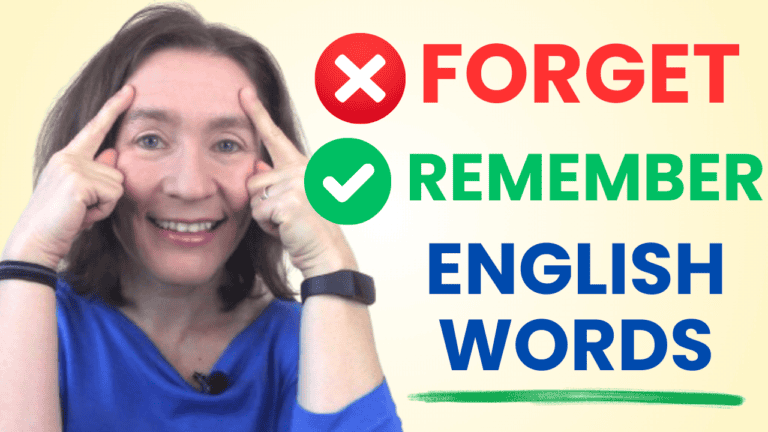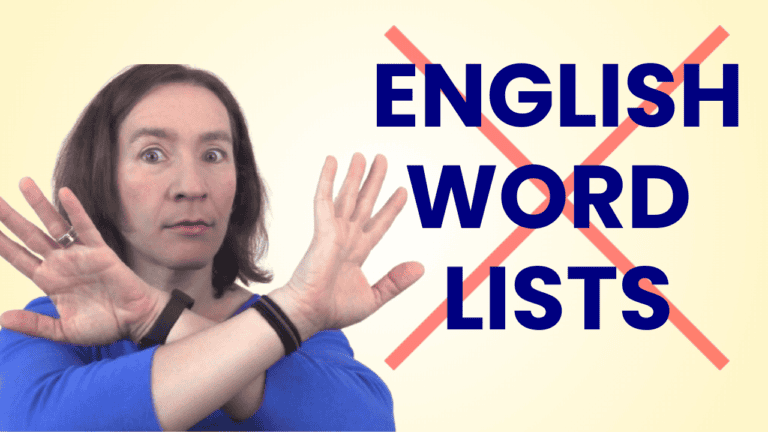
Hello students! Today is the final day of our mini-course on words with multiple meanings – I hope you’ve been enjoying it.
If you like my teaching style and you want to learn more, I suggest you check out my courses.
Our multiple-meaning word of the day is SET.
set = physically put something in a position
The basic meaning is to physically put something in a position – you can set a book on a table, set some boxes next to a desk, and so on.
Now in everyday English, it’s more common to use “put” – put a book on a table, and put some boxes next to a desk. But there are three places where we always use set, and not “put,” to refer to putting things in position.
One is in the expression “set the table” – this means to prepare a table for a meal by putting plates, napkins, forks, knives, spoons, and glasses on it.
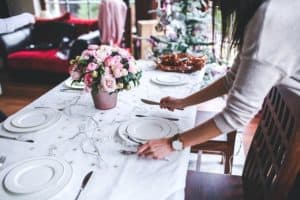
Another one is when a doctor sets a bone or sets a fracture – this is when you break a bone, and the two parts are out of place, so the doctor needs to set the fracture, meaning to put the parts of the bone into place, into alignment, so that they heal properly.
And the third one is when talking about jewelry, usually about a stone being set in a surrounding of metal or other stones. For example, this diamond is set (meaning placed, put, located) in a gold band.
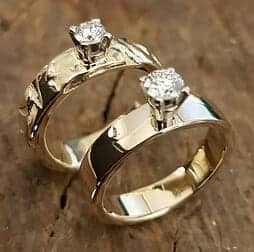
set = put something into a certain state
Set can also mean to put something into a certain state.
A common example of this is to set something on fire or to set fire to something – you are putting it into the state of burning. If you throw a cigarette into a pile of leaves, it would probably set the leaves on fire. If someone sets fire to a house or building on purpose, that’s a crime (it’s called arson).
Another expression is to set someone/something free, meaning to make it free when it was currently trapped or restricted. Maybe you manage to catch a mouse inside your house, but instead of killing it you set it free outside.
Another expression is to set something in motion, which means to start a process and make it begin to move forward. For example, after being elected, politicians try to set their plans in motion – put them into a state of moving forward.
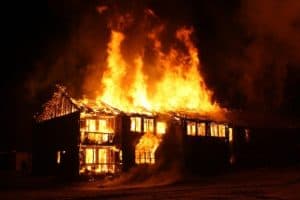
set = adjust controls on a device
We also use “set” for adjusting controls on a device – to set an alarm means to program your clock, watch, or cell phone to sound an alarm at a certain time. I usually set my alarm for 7:30 am because that’s when I like to get up.
Some houses or apartments have a thermostat to control the temperature – if you set the thermostat to 70 degrees, you are adjusting the controls so that the system will maintain the house at that temperature.
On your phone or computer, you’ll often find a section called “Settings” – this is where you can adjust the basic configurations of the device.

set = decide on a date/price
“Set” can be used for deciding on something, most typically a date – when two people plan to get married, they would set a date for the wedding. They’d decide that the wedding will be on July 10th, for example.
Sometimes “set” is also used for deciding on a rate or a price. A store might set the price of a new product at $50 – meaning they have decided to sell it at that price.
set = establish
A similar but slightly different use of set is to establish. We see this in the following examples:
- set a record: meaning to establish a record. She set a record for the fastest time swimming across the river
- set a precedent: means to establish an example that will serve as a reference for later cases. If my daughter is crying and screaming for some candy and I give it to her, I am setting a precedent and she’ll learn that she can get what she wants by crying and screaming – so she will use this strategy for future cases.
- set the agenda for a meeting or conference: decide on the topics that will be addressed, as well as the schedule for covering them
- set a good/bad example: an example of good or bad behavior that others will imitate. A teacher would try to set a good example for the kids in her classroom by always being kind, so that the students would hopefully imitate that behavior. If she yelled and cursed, that would be setting a bad example.

set (adjective) = fixed or established
“Set” as a verb can mean “to establish,” and “set” as an adjective can describe something that is already fixed or established.
For example, a factory would have a set procedure for operating the machines. It has an established procedure that does not typically change.
One idiom using “set” in this manner of being firmly fixed/established is saying “he’s set in his ways” – this describes someone who is NOT flexible, who is not open to change and new perspectives. Instead, he’s set in his ways – he’s firmly fixed/established in his current perspective and habits.
set (adjective) = ready
“Set” can also mean “ready.” We typically use this in the expression “all set.”
For example, if you’ve prepared some paperwork for new employees who will be starting their jobs tomorrow, and your boss asks you about it, you could say “it’s all set” – it’s ready.
Or if you’re going to watch a movie at home, and your boyfriend first has to make popcorn and get a blanket and some drinks – once he is done preparing, he might say “All set” meaning he is ready for the movie to start.
set (noun) = a group of similar things
“Set” as a noun can mean a group of things, usually a group of things that are all the same, similar, or that are all in one category. We call this a set of keys – those are all the same. Or maybe you buy your father a set of tools for Christmas – different types, but all in the category of tools.
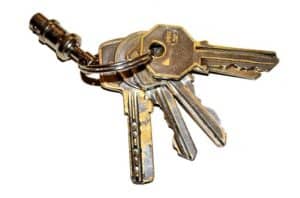
set = physical place where scenes are filmed
When talking about TV shows, movies, and plays in the theater, “set” has two meanings.
As a noun, the “set” is the place where scenes of the show, movie, or play are acted and filmed. Producers of shows and plays create a set using real or fake objects to give the impression of being in an area. So the “set” is this physical group of objects and furniture and buildings, used in TV or theater productions.
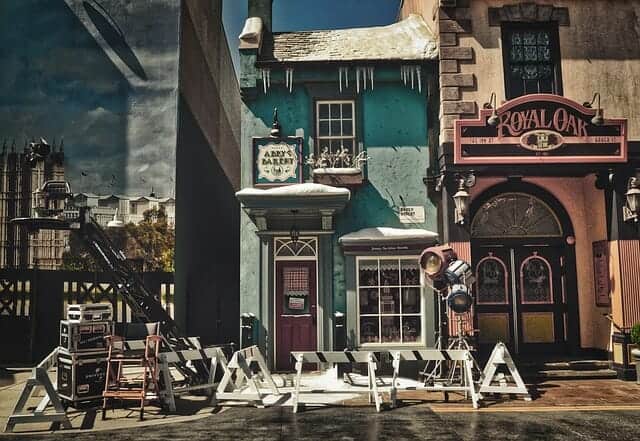
set = imagined location / time period of a scene
We can also use “set” as a verb to refer to the overall place and time where the story takes place.
For example, we can say the film is set in 17th-century England, meaning the story happens in the 17th century, in the country of England. Or the show is set in modern-day Chicago, meaning the location of the events is Chicago in the present time.
set = when the sun goes down below the horizon
One simple and specific meaning of set that you probably already know is when the sun goes down below the horizon. You could say “in the summer, the sun sets at 8 pm.” The event of this happening is called sunset (all one word). For example, the beach party continued after sunset.

Phrasal verbs with SET
Let’s move on to phrasal verbs with set.
Set apart means to make something separate, noticeable, and distinct from all the others. If you’re considering various study programs, and only one of them includes some interesting travel, you could say the travel is what sets this program apart from the others. It makes you notice how it’s distinct.
Set aside means something different – to set something aside means to put something on the side because you are not using it at the moment, or you will use it later. This could be done physically, for example, I set aside the hammer and reached for the screwdriver. I put the hammer to one side because I’m not using it right now.
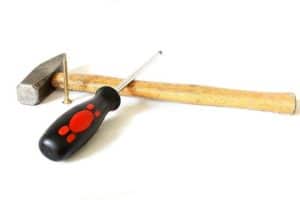
Or it could be non-physical, for example, I’m setting aside 5% of my paycheck every month because I’m saving up for a new bike. I’m putting 5% of my paycheck to the side and not using it right now because I’ll use that money later to buy a bike.
We can also say things like “We need to set aside our differences and work together,” meaning we need to leave our different opinions to the side so that we can focus on cooperating.
If something sets you back, it means it delays you or prevents the process from moving forward. For example, if you are trying to finish a project and you need some information from a co-worker, but that person is on vacation and not responding to emails, that would set back the project – delay it.
The noun form, setback (all one word) can be used to talk about an event or obstacle that prevents progress. If a professional soccer player breaks his leg, that would be a setback in his career, it would stop his career from growing until his leg healed.
The phrasal verb “set off” can mean to begin a journey. For example, “We set off on the hike around 8am” – meaning we started hiking.
“Set off” is also used when something causes/triggers an event, especially an alarm or explosion. If a basketball hits a parked car, it might set off the car alarm. Or a terrorist might set off a bomb – cause it to explode.

Saying something “sets you off” is an informal way to say it makes you “explode” with anger. For example, “I didn’t mind his criticism of my work, but when he insulted my character, that really set me off” – it made me so angry that maybe I yelled or cursed at him.
A very common phrasal verb is “set up.” This most often means to assemble something or put it in a standing position so it’s ready to use.
When you go camping, you set up a tent. After you knock down bowling pins, a machine sets them up – puts them in a standing position. A third-grade teacher might set up an activity for the kids in her class – meaning she assembles the supplies and prepares the objects by putting them in place so they’re ready to use.
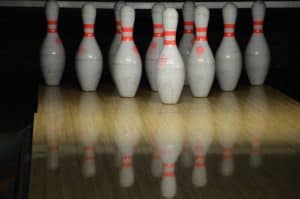
Idioms with SET
As always, we’ll finish with some interesting idioms.
If you set your sights on something, it means you really want to do it and you make it your goal. I could say my daughter has set her sights on attending the best university in the country.
Another way to talk about an intense desire is to say you have your heart set on the object or goal. For example, I have my heart set on traveling to Paris for our anniversary.
Or you could say you’re dead set on it, you’re very determined to do it – I’m dead set on improving my English, so I signed up for three courses.

To set the stage for something means to prepare for that thing to happen, or make it more likely that the thing will happen.
You could say, “My parents’ different religious views set the stage for their divorce” – so they had different opinions on religion, and this prepared the way or contributed to their divorce happening. Or the invention of smart phones set the stage for our culture of always being connected.
“Set foot in” a place is simply an informal way to talk about entering that place. It’s often, although not always, used in the negative form. For example, “I got food poisoning at that restaurant – I’ll never set foot in it again!”
If something is “not set in stone,” it means it’s not confirmed or final. Let’s say you’re going on vacation and you have a few ideas about activities to do, but you’re not 100% committed to them. You could say your plans for the trip aren’t set in stone because they are not totally finalized; there’s still flexibility to change them.
Our final expression today is “set the record straight” and this means to correct a false fact or misunderstanding.
Let’s imagine you win a smaller amount of money in the lottery, like $1,000. But then you hear some of your friends commenting that you must be a millionaire. You could say “Let me set the record straight – I’m not a millionaire, I only won $1,000.” You are correcting the false belief that you’re now super rich; you’re setting the record straight.

We’ve now reached the end of this mini-course – can you believe it?
In just 5 days you’ve learned over 100 different ways to use the words run, get, break, cut, and set. I know it’s a lot of information to take in, so I’d recommend reviewing all the lessons to remind yourself of all the meanings.
To continue learning, you can keep following my free lessons by e-mail, or on YouTube – but if you have your heart set on becoming fluent in English – if you really want this, if it’s your goal – one of the best ways is to join my courses.
These free lessons are helpful, but my courses are even more detailed and organized. They will help you learn English effectively, even if you have little time to study – and I have courses on all the different areas of the language: speaking, listening, vocabulary, grammar, phrasal verbs, and much more.
You can click on the link to take free sample lessons as well.
I hope you enjoyed this mini-course. Thanks for joining me!







